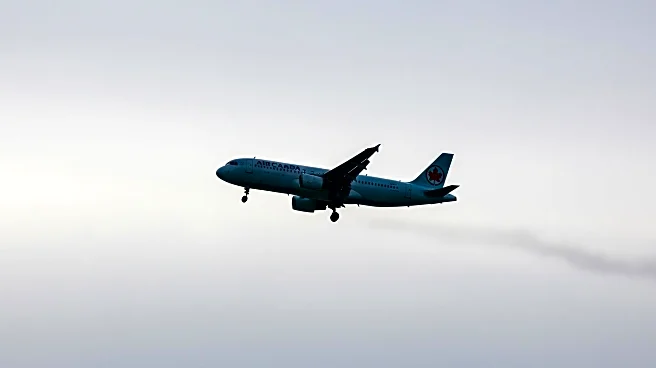What's Happening?
Air Canada has announced the suspension of its plans to resume limited operations due to the Canadian Union of Public Employees (CUPE) instructing its flight attendant members to defy a directive from the Canadian Industrial Relations Board (CIRB) to return to work. The strike by CUPE led to the suspension of all Air Canada and Air Canada Rouge flights on August 16, 2025. The CIRB had ordered the resumption of activities, ending both the strike and the lockout imposed by Air Canada. As a result, approximately 240 flights scheduled for the afternoon have been canceled, affecting the airline's typical operation of 700 flights daily. Customers with canceled flights are advised not to go to the airport unless they have confirmed flights on other airlines. Air Canada is offering options such as full refunds, credits for future travel, or rebooking on other carriers, although capacity is limited due to peak travel season.
Why It's Important?
The suspension of Air Canada's operations due to the CUPE strike has significant implications for the airline industry and travelers. The disruption affects hundreds of flights, causing inconvenience to passengers and potential financial losses for the airline. The strike highlights ongoing labor disputes within the airline industry, which can impact service reliability and customer satisfaction. The situation underscores the importance of effective labor relations and the potential consequences of industrial actions on business operations. The airline's response, including offering refunds and rebooking options, aims to mitigate the impact on customers, but the limited capacity during peak travel season poses challenges.
What's Next?
Air Canada plans to resume flights by tomorrow evening, contingent on CUPE's compliance with the CIRB directive. The airline will continue to communicate with affected customers regarding their options and rebooking possibilities. The resolution of the labor dispute will be crucial for restoring normal operations and minimizing further disruptions. Stakeholders, including government agencies and labor unions, may engage in negotiations to address the underlying issues and prevent future strikes. The situation may prompt discussions on labor policies and practices within the airline industry, potentially influencing future labor relations strategies.
Beyond the Headlines
The defiance of the CIRB directive by CUPE raises questions about the balance of power between labor unions and regulatory bodies. The incident may lead to legal and ethical considerations regarding compliance with government directives and the rights of workers to strike. The broader implications for labor relations in Canada could influence similar disputes in other industries, highlighting the need for effective conflict resolution mechanisms. The situation also emphasizes the importance of contingency planning for airlines to manage unexpected disruptions and maintain service continuity.










